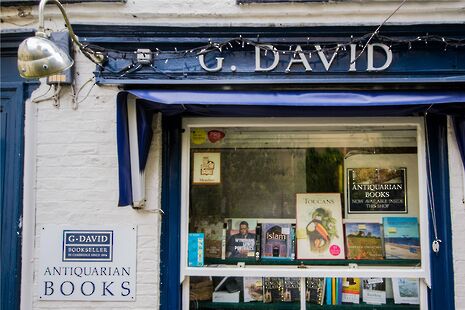Bookshop: G. David Antiquarian Booksellers
Harry Cochrane is enchanted by a booklover’s paradise off the beaten track

When you enter G. David booksellers, you invariably drive the door into somebody's back. With sincerest apologies, you step in and squeeze down a brief isthmus of corridor, before turning left down a gentle ramp and arriving in a hushed, spacious bibliosphere. Nothing that you see here is under eighty years old, except perhaps the man or woman behind the desk.
G. David is not exclusively an antique bookshop, but it advertises itself as such. Not that it advertises itself very loudly. Tucked away in the elbow of St. Edward's Passage, it seems to go unnoticed by pedestrians exploiting the shortcut between King's Parade and Market Square. For form's sake, a couple of shelves and boxes stand outside, along with a tray of very tempting William Blake prints; but, for the most part, this is a bookshop that delights in being inconspicuous.
The first room, containing G. David's more modern fare, is dominated by a massive square column of bookshelves and P. G. Wodehouse. Some generous discounts are to be found here: I've picked up first editions of Paul Muldoon's Maggot and Horse Latitudes for a fiver each. Off to the right is the much more rarefied Classics forum, which shares its space with literary biographies and the Collected Letters of various authors.
But the real reason that you come here is the antiquarian books room, the room by which G. David defines itself. And when you tiptoe into it, you suspect that you've penetrated some secret inner sanctum, a house of extinct publishing customs. Everywhere there are pages and fonts small enough to nowadays be counted as a health hazard. A tiny collection of Matthew Arnold's poems gives new meaning to the term 'hardback', its covers being made entirely out of wood. There is, of course, a copy of the New Testament, in the original Greek. I currently have my eye on a copy of Samuel Johnson's Dictionary, with the intention of checking whether, if Edmund Blackadder is to be believed, it really does lack the word 'contrifibularities'.
Admittedly, even a single gem from this treasure trove will cost at least £10-£20, and the true desirables will take a significant chunk out of the student loan. This does make every G. David purchase something of an event, and the book binge is not really a possibility here. But, in actual fact, I probably only buy something once in every five visits to this shop, because it is so much more than a shop. It is an escape off the busy street into low-ceilinged solemnity, where the quiet is, unlike a library's enforced silence, natural. I only wish that the lights were much dimmer and the atmosphere a bit more penumbral, and the books cheaper, and the range bigger, and the card machine more receptive. Next time you are in central Cambridge, try and locate it. Even if you don't have an excuse to be in central Cambridge, you do now. Make the pilgrimage.
 Features / How sweet is the en-suite deal?13 January 2026
Features / How sweet is the en-suite deal?13 January 2026 Comment / Will the town and gown divide ever truly be resolved?12 January 2026
Comment / Will the town and gown divide ever truly be resolved?12 January 2026 News / 20 vet organisations sign letter backing Cam vet course13 January 2026
News / 20 vet organisations sign letter backing Cam vet course13 January 2026 Arts / Fact-checking R.F. Kuang’s Katabasis13 January 2026
Arts / Fact-checking R.F. Kuang’s Katabasis13 January 2026 Music / Inside Radiohead’s circle13 January 2026
Music / Inside Radiohead’s circle13 January 2026








